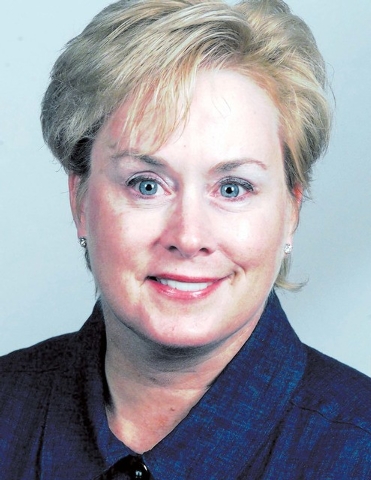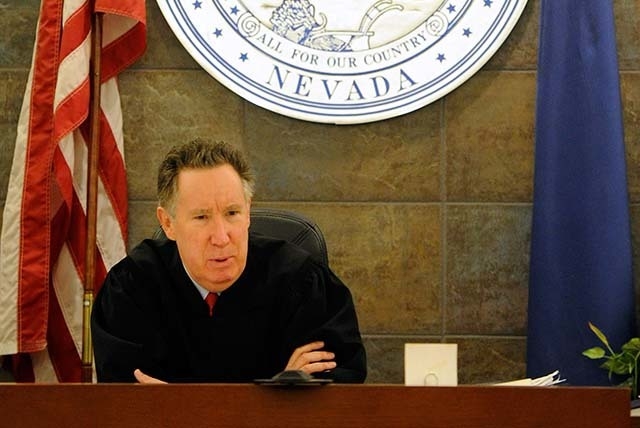Family Court judge leads judicial pack in peremptory challenges
Every year, parties involved in civil actions in Clark County write thousands of dollars in checks for the right to change the judge assigned to their case.
For $450, litigants in civil cases are entitled to file what is known as a “peremptory challenge” to have a different judge hear the matter. They may do so for any reason, within a specific time frame, and litigants file hundreds of such challenges each year in Clark County.
Attorney Bruce Shapiro, who has practiced family law in Clark County since 1990, said one could argue that a judge’s peremption rate is a better indicator of lawyers’ perceptions of that judge than the Las Vegas Review-Journal’s Judicial Performance Evaluation, in which lawyers rate judges anonymously.
“An attorney likely will not spend $450 unless he or she believes that there is a compelling reason to change the judge and that there is a likelihood of drawing a better judge for that particular case,” Shapiro wrote in an email.
Besides conducting the survey this year, the Review-Journal analyzed peremption statistics for all Family Court and District Court judges in Clark County. The statistics covered a 33-month period from January 2011 through September 2013.
One judge led the pack during that time with 200 challenges: Family Court Judge Gayle Nathan.
On this year’s performance evaluation, 48 percent of the lawyers who rated Nathan said they would recommend retaining her on the bench.
During a recent interview with the Review-Journal, Nathan blamed her high number of peremptory challenges on a group of lawyers associated with Equal Rights for Divorced Fathers, an advocacy group that assists men involved in family cases.
Nathan said the group has targeted her because of interviews she gave in 2004 as an attorney practicing family law.
In one interview about Equal Rights for Divorced Fathers, she said, “It’s like a terrorist organization against women.”
She also said the organization “encourages meanness.”
During Nathan’s first month on the bench, in January 2011, she faced 37 peremptory challenges. She said 13 of those were filed by litigants who were representing themselves and whose papers were witnessed by notaries who work for the divorced fathers group.
Nathan had 103 challenges that year.
In 2012, she had 66 challenges. Nathan said 33 of those were witnessed by notaries from the divorced fathers group.
That trend has continued this year. Nathan reviewed her numbers for the first nine months of 2013 and found that 19 of her 31 challenges were witnessed by notaries who work for the organization.
“That’s a huge number of peremptories filed by people who are representing themselves and who have no guarantee that they are going to get a different result with a different judge,” Nathan said.
Ernest del Casal Jr., who founded Equal Rights for Divorced Fathers in 1982, does not deny that his organization has targeted Nathan. But Del Casal said the group is responsible for only a fraction of her peremptory challenges.
“She’s not a favorite of anyone at the courthouse,” he said.
Del Casal said members of his group have found Nathan to be “anti-father” as both a practicing attorney and as a judge.
Del Casal tells men Nathan is the worst judge for fathers going through divorces, but he claims he’s “not the only one doing that.”
“She’s just using me as a scapegoat because she’s a lousy judge,” del Casal said.
The organization has six lawyers on its advisory board.
Nathan said she represented men and women in about equal numbers during her 17 years as a family law attorney.
“I’m absolutely not biased against either gender,” she said.
At the Review-Journal’s request, Shapiro analyzed the peremption statistics for Family Court judges. He analyzed only the 12 judges who had full-time domestic calendars that were subject to peremptions.
He said reasons for using a peremptory challenge vary. An attorney may have a personality conflict with a judge, the judge may have a perceived bias on an important issue in the case, or the judge’s positions on certain issues may be unknown.
“In some cases it may be used solely for the purpose of causing a brief delay in the divorce proceedings,” Shapiro wrote.
The fees collected through the filing of peremptory challenges, which totaled $319,050 in fiscal 2013, are used for a variety of projects and contribute to the state’s payment of judges’ travel costs for work and professional engagements.
The fees do not pay for travel for Supreme Court justices, high court spokesman Bill Gang said.
Shapiro said some new Family Court judges are perempted frequently until they acquire a “track record.”
If a judge’s peremption rate does not decrease over time, Shapiro said, then the challenges may be attributable to a personal issue with the judge or an overall lack of confidence in the judge’s abilities.
Although Nathan received the most challenges, Shapiro noted that her peremption rate has decreased significantly each year.
“This decrease suggests that attorneys are slowly becoming more comfortable with the rulings and case management of the judge,” he wrote.
He noted that Nathan, Kenneth Pollock and Sandra Pomrenze accounted for more than half of all peremptory challenges filed in Family Court.
On this year’s performance evaluation, only 40 percent of the lawyers who rated Pollock recommended him for retention, and 47 percent of those who rated Pomrenze thought she should keep her job.
In District Court, Jessie Walsh led with 93 challenges in 2011 and 48 challenges in 2012.
But Ronald Israel is leading with 42 challenges for the first nine months of this year, followed by Walsh with 39.
Walsh would not comment on her numbers, but Israel issued the following statement regarding his:
“Since I carry an all civil docket, my peremptory challenge numbers are likely to be higher than those who carry a split docket. Prior to taking the bench, I had a 30-year career as a vigorous plaintiff’s attorney; that likely accounts for a significant number of the peremptory challenges. I take my role as a judge very seriously and strive to be fair and balanced to ensure that justice is served in every case that comes before me.”
Israel had the second-highest number of challenges in 2011 and 2012.
Of the lawyers who responded to the 2013 Judicial Performance Evaluation, only 42 percent said they would recommend Walsh for retention, while 61 percent said they would recommend Israel.
Contact reporter Carri Geer Thevenot at cgeer@reviewjournal.com or 702-384-8710. Follow @CarriGeer on Twitter.
RELATED

2013 Judicial Performance Evaluation
- Lawyers give thumbs down to 5 of 20 Family Court judges
- Controversial case decisions dog District Court judges
- Supreme Court justices draw plaudits from state attorneys
- Clark County attorneys rate the judiciary; 13 percent found wanting



















